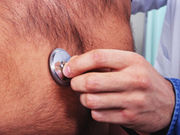Lower testosterone concentrations at years 10, 17 not linked to cardiovascular autonomic neuropathy
TUESDAY, Nov. 17, 2015 (HealthDay News) — For men with type 1 diabetes, testosterone levels are not associated with cardiovascular autonomic neuropathy (CAN), according to a study published online Nov. 12 in The Journal of Sexual Medicine.
Catherine Kim, M.D., M.P.H., from the University of Michigan in Ann Arbor, and colleagues examined the correlations between testosterone concentrations and measures of CAN among men with type 1 diabetes. Men were enrolled from the Diabetes Control and Complications Trial and its observational follow-up, the Epidemiology of Diabetes Intervention and Complications (EDIC) Study. Testosterone was measured in stored samples from EDIC follow-up years 10 and 17.
The researchers observed no association between lower total and bioavailable testosterone concentrations at follow-up years 10 and 17 with CAN presence at year 17. After adjustment for covariates, including age, body mass index, smoking status, hypertension, and glycemia, higher total and bioavailable testosterone concentrations correlated with a higher (more favorable) Valsalva ratio (in analyses using Valsalva ratio as a continuous measure) (P = 0.01 and 0.005, respectively).
“Testosterone levels are not associated with CAN among men with type 1 diabetes,” the authors write. “Although testosterone is associated with a higher Valsalva ratio, a more favorable indicator, the clinical significance of this association is not known.”
Industry contributors provided free or discounted supplies or equipment for the study.
Copyright © 2015 HealthDay. All rights reserved.








